 Who is in charge of Japan?
Japan's Prime Minister Yasuo Fukuda is running the country. But some
say the leader of the opposition, Ichiro Ozawa, is controlling what Mr
Fukuda can and cannot do.
That is because the opposition controls the upper house of
parliament, which is still discussing a controversial anti-terrorism
bill.
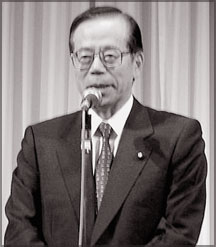 Mr Fukuda wants the bill passed, but Mr Ozawa decides when and if a
vote is held on the legislation - at least until 15 January. Mr Fukuda wants the bill passed, but Mr Ozawa decides when and if a
vote is held on the legislation - at least until 15 January.
After that date the prime minister can ignore the upper house and get
the bill passed without the opposition's say-so by virtue of his
coalition's overwhelming majority in the lower house.
But until then he has no option but to keep trying to persuade Mr
Ozawa to compromise.
Mr Ozawa appears in no mood to do this. Why would he? He knows that
for now at least he is pulling the strings.
That is frustrating for Mr Fukuda. He wants to visit China. He would
like to visit Europe for urgent discussion with leaders there ahead of
the annual meeting of the G8 nations in Hokkaido.
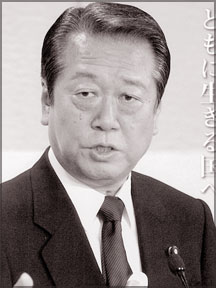
But it is hard for him to leave Japan before this issue is resolved.
The Japanese government is determined to pass this anti-terrorism law
to renew the mandate for its forces to contribute to the Bush
administration's "war on terror".
Privately, officials say that since Japan withdrew its refuelling
ship from the Indian Ocean at the end of the October, the flow of
intelligence from the US and its allies has slowed.
Japan's refuelling of US warships has divided public opinion
They also express concern about the effect of the withdrawal on
US-Japan relations. Since the end of World War II, the US has guaranteed
Japan its protection in the event of attack.
But if Japan is not prepared to play its part in anti-terrorism
operations, officials argue, will that not lead to questions being asked
in Washington about whether the security alliance is really worth it?
Tsuneo Watanabe, a fellow of the Centre for Strategic and
International Studies, says: "In the mid to long term the voices in the
US promoting the US-Japan alliance as a major pillar for the future US
security policy in Asia may be getting weaker."
But not everyone sees it that way. "There is a small group of
policymakers who work on US-Japan relations," says Professor Koichi
Nakano from Sophia University in Tokyo.
"They are the ones who suffer the most from the setback because they
are the ones who have been working so hard to 'normalise' or in fact 'remilitarise'
Japan, and they gain influence in Washington as Japan becomes more
useful to the United States," he says.
|
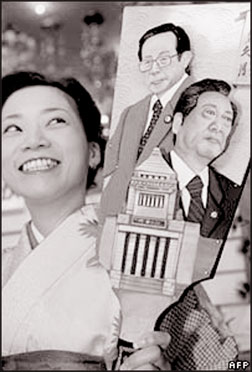
Some fear that the political stand-off may hurt relations
with the US |
"That is why they are making such a big deal out of something that
is, in the end, quite insignificant."
But Prime Minister Fukuda is rumoured to disagree vigorously with
that analysis. On this issue he will not back down.
There are risks though in this approach. For a start the polls
suggest that less than half the voters think it is necessary to pass the
bill. Other problems are piling up. The government announced in the
summer than the pension records of roughly 50 million people were
inaccurate.
It has promised to sort out the mess and yet this week it announced
that it is proving harder than expected.
At the same time, ministers are trying to deal with the fallout from
a corruption scandal in the Ministry of Defence.
The government is facing demands for compensation from people who
contracted hepatitis from infected blood products.
And there are fears the opposition's control of the upper house may
make it impossible to pass legislation to implement next year's budget.
He won't want to call an election without any achievements to show the
voters
If Mr Fukuda forces the anti-terrorism bill through parliament, the
opposition has made clear it will pass a censure motion against him in
an attempt to force him to hold a general election.
So could his determination to get this bill through cost him his job?
Professor Masatoshi Honda, an analyst from the National Graduate
Institute for Policy Studies, thinks not.
He does not think Mr Fukuda would see any benefit from subjecting
himself to an early electoral test. The censure motion would be
non-binding so he could just ignore it.
At the moment his coalition holds two thirds of the seats in the
lower house, a majority that makes it possible for him eventually to
override votes against government bills in the opposition-controlled
upper house.
If he dissolves the lower house and goes to the country his majority
will almost certainly shrink, if not disappear.
"He won't want to call an election without any achievements to show
the voters," Prof Honda says.
BBC
US House honours Burma's Suu Kyi
The US House of Representatives has voted to award Burmese
pro-democracy leader Aung San Suu Kyi its highest honour - the
Congressional Gold Medal.
Supporters of the bill, which passed 400-0, said the move was meant
to send a message to Burma's military leaders.
"We will continue to pressure the junta to release her and bring
freedom... to the people of Burma," said Joseph Crowley, a Democrat.
Ms Suu Kyi has been kept under house arrest for 12 of the past 18
years. Her National League for Democracy (NLD) won polls in 1990 but was
never allowed to take power.
"For three decades, Aung San Suu Kyi has valiantly led the
non-violent movement in Burma for democracy and human rights," Mr
Crowley said after the vote on Monday.
"Her work and dedication to the cause of freedom and individual
liberty has earned her recognition throughout the world, including the
Nobel Peace Prize.
"Today, the US House of Representatives showed her and the world that
she has also won the hearts and minds of the US Congress."
The bill will now be referred to the US Senate, which must also back
the measure. More than 300 individuals and groups have received the
Congressional Gold Medal. George Washington was awarded the first medal,
which originally was given to military heroes but was later expanded to
include prominent humanitarians, scientists, explorers, artists and
others.
Non-American recipients of the medal include Winston Churchill, Pope
John Paul II, Nelson Mandela, the Dalai Lama and Mother Theresa.
BBC
Putin ready to be PM after polls
Russian President Vladimir Putin says he will become prime minister
if his chosen successor, Dmitry Medvedev, wins the presidential election
in March.
He was speaking at a conference in Moscow of the governing United
Russia party, which has now confirmed Mr Medvedev as its candidate.
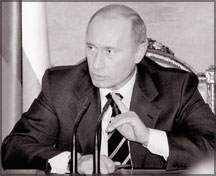
Mr Medvedev is expected to win, largely thanks to Mr Putin's own
popularity. Mr Putin is legally barred from serving a third consecutive
term as president but could stand again in 2012.
"If the citizens of Russia trust Dmitry Medvedev and elect him the
country's president I will be ready to chair the government," he told
the United Russia conference. 'Enormous resources'
Mr Putin's announcement ended speculation he might seek another route
to remain at the heart of Russian government.
When United Russia effectively turned this month's parliamentary
election into a referendum on his presidency, the party's resulting
landslide was portrayed as a message from Russian citizens that Mr Putin
should retain some national leadership role.
"I don't have the slightest doubt that [Mr] Putin... will keep using
his enormous political and professional resources, his influence both in
our society and in the world, for the benefit of Russia and its
citizens," Mr Medvedev said.
For his part, Mr Putin told the conference he was not afraid "of
transferring... the destiny of Russia to the hands of [Dmitry Medvedev]".
Reacting to news of the Putin-Medvedev tandem, the White House said
it was an internal Russian affair if Mr Putin became prime minister
after the next election. "We believe that we'll be able to have good
relations with Russia moving forward," said spokeswoman Dana Perino.
Mr Medvedev has already pledged to adhere as a leader to the policies
outlined during the Putin presidency.
He said last Tuesday that he wanted the benefits of economic growth
to reach all sections of Russian society.
The 42-year-old former lawyer managed Mr Putin's election campaign in
2000 and is now chairman of state energy giant, Gazprom. As first deputy
prime minister, he has also overseen national programmes in the areas of
health, housing and education.
Russia has made huge economic gains as a result of soaring
international oil prices. The government has been facing demands to
channel energy revenues into pensions, benefits and parts of the
country's infrastructure that have been decaying since the collapse of
the Soviet Union.
BBC
US presidential campaigners find out who their friends really are
At least eight viable candidates to be the next president of the
United States were preparing yesterday for a frantic final fortnight
before the first American voters deliver their verdict in the marathon
contest for the White House.
For the first time in modern American politics the race in both the
Democratic and Republican parties appears to be wide open with Hillary
Clinton faltering in recent weeks in the face of a challenge from Barack
Obama, while Rudy Giuliani and Mitt Romney - who once led the Republican
field - have watched aghast as Mike Huckabee has surged to the front.
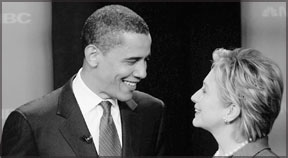
Yesterday a flurry of potentially important endorsements swirled
through the frozen air of the two crucial early voting states of Iowa
and New Hampshire. John McCain, a Republican candidate widely written
off after a disastrous summer, received the backing of the independent
senator Joe Lieberman, the Democrat vice-presidential nominee in 2000,
who said that he was best candidate to lead America "in the fight
against terrorism".
He is now running his presidential campaign on a shoestring budget
and spoke inside the public library in Concord before two dozen
supporters without the expensive trappings of his better-funded rivals.
On a blustery, sub-freezing day Mr McCain was in an upbeat mood,
describing Mr Lieberman's support of him as an "act of courage" and
pointing to newspaper endorsements that he hoped would win over New
Hampshire's large bloc of independent voters.
He still trails Mr Romney by 13 points in the latest poll of New
Hampshire, where, among Democrats, Mrs Clinton is shown as edging back
ahead of Mr Obama.
A poll yesterday in Iowa, where the state's caucus kicks off the
nominating process on January 3, shows Mr Huckabee ahead of Mr Romney by
nine points, with Mr Giuliani a further six points behind. Mr Obama
leads for the Democrats, nine points ahead of Mrs Clinton and John
Edwards.
Mr Romney was still drying his eyes yesterday from a tearful Sunday
TV interview when he once again had to defend his Mormon faith.
His campaign said yesterday that his claims in the same interview to
have received the valuable endorsement of the powerful pro-gun lobby,
the National Rifle Association, were false.
Mr Romney was still able to attack Mr Huckabee - who was trying to
improve his poor finances by raising money in Beverly Hills yesterday -
for fresh criticism of President Bush's foreign policy.
Mr Huckabee was also under fire over a bizarre episode dating back to
his time as Arkansas Governor when his teenage son was dismissed as a
holiday counsellor amid allegations about the hanging of a stray dog at
a Boy Scout camp. The Huckabee campaign was yesterday discomfited by
claims of a cover-up in Newsweek.
His fellow Republican Fred Thompson picked up the much sought-after
endorsement of the Iowa Republican congressman Steve King yesterday,
while Mr Giuliani's campaign was reported to be cancelling
advertisements in New Hampshire so that it could focus efforts on later
states such as Florida, where his poll lead was being eaten away by Mr
Huckabee.
The Republicans, who by this stage are usually uniting around an
establishment candidate, are in utter disarray this year with voters
indicating strong doubts about almost every one of their five top-tier
candidates.
Ron Paul, a sixth Republican candidate standing on a maverick
libertarian ticket, is doing his best to make the field even wider and
announced yesterday that he had smashed fundraising records for a second
time by generating no less than $6million (œ3million) on a single day,
Sunday.
Mr Obama, on a bus tour of northern Iowan cities, won the backing of
the Iowa Democrat congressman Dave Loebsack, giving him the backing of
two out of three Iowan Democrats on Capitol Hill. Mr Edwards was
expected to be endorsed by Mari Culver, the wife of the Iowa Governor,
Chet Culver.
Mrs Clinton, who was endorsed on Sunday by the influential Des Moines
Register newspaper, is flying around all 99 Iowan counties in what is
inevitably being called a "hilli-copter". She is now belatedly trying to
reintroduce herself to an increasingly sceptical Iowan public with
personal testimonials from friends and constituents "talking about the
Hillary I know".
This latest tactic from a campaign riven by internal dispute over
recent days is designed to soften an image which is often seen as cold
and calculating. On Sunday she stopped at a livestock auction to say: "I
know you're going to inspect me. You can look inside my mouth if you
want."
Yesterday she professed to be unconcerned by the tightening of polls
in Iowa and New Hampshire, saying: "I just don't pay attention to those
snapshots. I've done this a very long time and I never believe that any
election is at all predictable, let alone inevitable."
Timesonline, UK |
